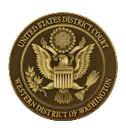The Honorable S. Kate Vaughan
United States Courthouse
700 Stewart Street, Suite 12132
Seattle, WA 98101-9906
Chambers: (206) 370-8760
Courtroom Deputy: (206) 370-8420
Proposed Orders: vaughanorders@wawd.uscourts.gov
Biography
Courtroom Rules
The parties and counsel are encouraged to advise the Court of their pronouns and may do so by including their pronouns in signature lines or advising the in-court deputy clerk of pronouns and honorifics before a hearing begins, either via email or in person.
Mobile devices must be turned off before entering the courtroom.
Please provide advance notice when you intend to utilize the courtroom’s video displays or have other presentation technology questions.
The Court encourages opportunities for junior attorneys and Rule 9 licensed legal interns (accompanied and supervised by a more experienced attorney) to appear and argue in Court. Requests for leave for Rule 9 interns to argue in Court will be freely granted, and the Court may permit multiple attorneys to argue for one party if this creates an opportunity for junior attorneys to participate.
Consent to Magistrate Judge
GO 11-22 Modifying Amended General Order re Consent and Referral to Magistrate Judges
After parties consent to a Magistrate Judge, firm pretrial conference and trial dates will be set. After setting the trial date, Judge Vaughan will enter an Order Setting Trial Date and Related Dates setting out the dates all pretrial documents are due.
Case and Trial Management Templates
Name |
Date added |
| 1. Order Regarding Initial Disclosures, Joint Status Report, and Early Settlement | 2/2/2023 |
| 2. Order Setting Trial Date and Related Dates | 2/2/2023 |
| 3. Pretrial Conference Agenda - Civil | 2/2/2023 |
| 4. Civil Jury Impanelment Procedures | |
| 5. General Voir Dire Questions - Civil | 2/2/2023 |
| 6. Individualized Trial Program (LCR 39.2) | 12/23/2021 |
Expedited Case Management through the Individualized Trial Program
The Court encourages parties to consider agreeing to an Individualized Trial, which is a consensual, binding trial before a jury or a judge with limited discovery and limited rights to appeal. The Individualized Trial Program offers an abbreviated, efficient and cost-effective litigation and trial alternative. See LCR 39.2. Recognizing that individualized trial procedures are most efficient when tailored to the specific needs of a case, the parties may propose modifications to the standard procedures, subject to the Court’s approval. If the parties agree to participate in the Individualized Trial Program, the Court will set a case management conference to discuss the limits on discovery and the need for dispositive motions. Trial will be held no later than six months after the Individualized Trial Agreement is approved by the Court.
Discovery Issues
Judge Vaughan strongly encourages parties to make every effort to resolve discovery disputes without the Court’s intervention. The Court strictly construes the meet and confer requirements. To the extent motions practice is necessary, Judge Vaughan encourages parties to take advantage of the expedited discovery dispute procedures described in Local Civil Rule 37(a)(2). This approach may resolve the dispute in an expedient manner and avoid the extra costs associated with motions practice. The moving party must make reasonable efforts to have all parties to the discovery dispute participate in contacting the Court to request a telephonic motion. See Local Civil Rule 7(i). Counsel may contact the Court’s deputy clerk by telephone at (206) 370-8420 to arrange a telephone conference with the Court.
Motions Practice
Oral Argument
Judge Vaughan does not automatically schedule oral argument upon request. The parties will be contacted if, after reviewing the briefing, Judge Vaughan believes oral argument will be helpful in resolving the motion.
Courtesy Copies
Courtesy copies are not required.
Settlement Conference Procedures
When a case is referred for a judicial settlement conference before Judge Vaughan, the Court will promptly issue an Order setting the date and time for the settlement conference and outlining settlement procedures. Settlement conferences may be in person or, based upon a joint request from the parties, via Zoom.
Settlement Conference Scheduling Order
Pro Se Parties
Parties proceeding pro se (representing yourself without a lawyer) should refer to the Western District of Washington Pro Se Guide for helpful information.
Pro Hac Vice
Both attorneys admitted pro hac vice and their Western District of Washington counsel should read and be familiar with the Court’s Local Rules and general litigation practices.
Externships
Judge Vaughan chairs the WDWA Summer Externship Program. The program is open to all 1L and 2L students at an accredited law school who seek a judicial externship as part of a law school judicial externship class. Exceptions to the externship class requirement will be considered on a case by case basis. This is a summer externship that starts between May 31, 2022 and June 13, 2022, depending on the students’ law school terms. The externship is an eight-week, full time program. The externship will be demanding, and externs should be hardworking, organized, honest, ethical, and committed to making the most of their summer to gain critical lawyering skills and habits. Preference is given to students who are underrepresented in the legal profession. Further information can be found here.
